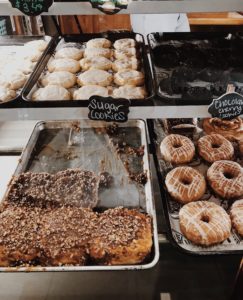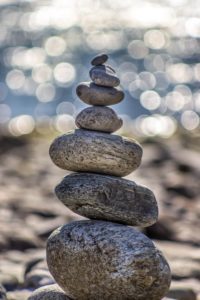by Jenny Rose | Sep 11, 2022 | Choice, Power
Probably every child is told we all have to do things we don’t want to do.

Photo by Cristina Gottardi on Unsplash
Children are concrete, and I was no exception. When I heard we all have to do things we don’t want to do, I thought it meant that’s what life was supposed to be about, a kind of slavery to all those things we don’t want to do. No one talked to me about balance, or doing the things we do want to do.
It made life seem like an unhappy business, years and years of unending duty, responsibility, and doing what I didn’t want to do. No recess. Or maybe what I really wanted to do was bad and wrong? Maybe I should want to do what I didn’t want to do. I wasn’t sure. A part of me went underground. I didn’t want anyone to know how bad I was, how flawed. I worked hard at the things I didn’t want to do and hid the things I did want to do, in case they were wrong.
But I couldn’t conceal the feeling of wanting and not wanting from myself. I used to make hidey holes in whatever house we were living in at the time and go to ground with a book, but I always felt guilty. I wanted to read. Doing what I wanted to do was bad. I should have been helping my mom do all the things she didn’t want to do.
The pronouncement that we all have to do things we don’t want to do is stated as a Cosmic Truth, especially as an adult tells it to a child. It’s loaded with feelings and experience a child can’t possibly understand, but the subtext was clear to me:
Life is not much fun.
I can’t resist picking apart Cosmic Truths as an adult, and as I think about this one it occurs to me it really has to do with personal power more than wanting or not wanting. It’s not framed in terms of personal power because our emotional intelligence is so low. Making choices based on whether we want to do something or not is childish. Power resides in the act of choice, not in the wanting or not wanting.
Steering our lives solely by our desires is hedonism, a belief that satisfaction of desires is the purpose of life. Desire, though, is so shallow, so fleeting. And it’s never permanently satisfied. No matter how well and pleasurably we’ve eaten, we’ll be hungry again. Desire is a treadmill we can never get off.

This is not to say we shouldn’t ever choose something we want or say no to something we don’t want, but our desire is easily manipulated. That’s why advertising works. If we can be easily manipulated, we’re not standing in our power. Addiction is based, at least in the beginning, on wanting and not wanting.
A more useful question than What do I want to do? is What would be the most powerful thing to do? We might want to eat a carton of ice cream, but a walk feeds our health, well-being, and thus personal power much better. After all, one carton of ice cream leads nowhere but to another. Personal power can lead us to joy and experience a carton of ice cream never dreamed of.
- If we don’t choose to do difficult, frightening, or new things, we’ll never grow.
- If we don’t choose to take care of our bodies, they won’t function well.
- If we don’t choose to be self-sufficient and resilient, we’ll be dependent.
- If we don’t choose to learn anything, we’ll remain ignorant.
- If we don’t choose to plan ahead, prepare, or manage consequences, we diminish our choices, waste resource, and weaken the contribution we’re capable of making.
- If we don’t choose the responsibility of commitment and making choices, someone else will make our choices for us.
And so on.
I’m changing the frame. I’m less interested in what I want and what I don’t want and more interested in how my choices affect my power, and the power of those around me. I’m willing to do what I don’t want to do if it’s a step on a road leading to integrity, power, healthy relationship, or anything else important to me. At the same time, I can exercise my right to say no to things that won’t take me where I want to go.
It’s about power, not desire. Any three-year-old can want and not want. It takes an adult to manage a healthy balance of personal power.

Photo by Deniz Altindas on Unsplash
by Jenny Rose | Aug 20, 2022 | Connection & Community, Emotional Intelligence
Trust: Firm belief in the reliability, truth, ability or strength of someone or something (Oxford Online Dictionary)
Mistrust: General sense of unease towards someone or something
Distrust: Specific lack of trust based on experience or reliable information
Leo Babauta recently published a piece on practicing trust which has given me much food for thought.
Trust is an uncomfortable subject for me. For most of my life I’ve considered myself to be shamefully distrustful. As I’ve learned emotional intelligence, I’ve realized I have plenty of good reasons for my mistrust and distrust, but there’s still a part of me that feels I should be more trusting, more willing to give others a second, or third, or hundredth chance, less guarded, more open, more forgiving.

Photo by Liane Metzler on Unsplash
Except I know intellectually forgiveness does not mean an automatic reinstatement of trust.
In my heart, I feel like a bad person, especially a bad woman, because throughout my life people who say they love me have appeared to be hurt by my lack of trust. Yet those same people have given me reasons not to trust them.
When I wind up in these confusing emotional cul-de-sacs, I blame myself. I’m being too dramatic (again). I’m being a bitch. I’m mean. I can’t love, or let anyone love me. (Does trust = love? Does all love automatically come with trust?) When I explain the specific events leading to my mis- or distrust, I’ve frequently been told the other party doesn’t remember saying what they said or doing what they did. This implies I’m nitpicking, ridiculously sensitive, keeping score, or even making it up. I wonder if I’m being gaslighted, or if I’m just not a nice person.
Years and years ago I made a rule for myself: give every situation or person three chances before deciding not to trust. It still feels fair to me. Sometimes things happen. We have a bad day. We say hurtful things, or don’t keep our word, or make a boneheaded choice, breaking trust with someone. I know I’ve done it, and I’d like to be given the benefit of a doubt.
The benefit of a doubt is fair, right?
I still follow that rule. It feels appropriately kind to others and like good self-care. Yet I feel guilt nearly every day over the people in my life who I want to trust, feel that I should trust, and don’t trust.
Babauta’s article specifically addresses signs of distrust of ourselves, and some ideas about practicing self-trust. I never connected problems with focus, fear or uncertainty, procrastination or indecision with lack of self-trust, but I can see they might be. If we don’t trust our priorities, resilience, or choices, it’s difficult to be decisive or take risks with commitments and problem solving.
If we don’t trust ourselves to cope effectively with sudden changes and reversals and frightening situations, uncertainty and chaos disable us, making us vulnerable to anyone or anything promising relief, certainty, or help.
The boundary between trust in ourselves and trust in others is permeable. If we define ourselves, as I do, as “having trust issues,” presumably that includes issues with ourselves as well as others.
It makes me shudder to imagine living with no feeling of belief in the reliability, truth, ability or strength of anyone or anything. How could anyone sustain such an emotionally isolated condition, not only from those around them but from themselves?
I do have people in my life I trust. Is it possible I don’t have trust issues? Is that just a polite, apologetic, and roundabout way of avoiding a direct “I don’t trust you?”
Do I have to answer that?
It’s true I trust far fewer people than I distrust.
But it’s also true I give people and situations a chance. Three chances, in fact. At least.
Why does it seem so cruel to tell someone we don’t trust them?
Trust, as I experience it, is not all or nothing. I might trust a person to be kind and caring but never allow them to drive me anywhere. I might trust a person with money but never trust them to be on time. I trust myself to be there for others, but I haven’t trusted myself to be there for me.
Consumerism is about distrust. We’re actively groomed to distrust ourselves. Yesterday I was laughing with a friend about articles on MSN. There was an article about trends and fashion in decorating, as though it matters. Shiplap is out. White kitchens are out. Accent walls are out. Then there was an article about how to properly fold plastic grocery bags. I’m not kidding. Did you know you’ve been storing plastic grocery bags the WRONG WAY all these years? How could you be so incompetent? A capitalist culture only survives as long as people buy things, and advertising (and a lot of other media) is about the ways you need to improve, do it right, be better.
Advertising is manufactured distrust. We’re inadequate, but a widget would make us better. We buy, and we discover we still don’t feel good enough, and another ad tells us we need a nidget. So we buy that, but then we see a gidget on sale that will make us even better …
Who benefits most from our lack of trust in ourselves?
I believe information is power. I believe education is power. I believe in science, data, and critical thinking. I trust those things.
Who benefits most from the breakdown of public education, the demonization and gutting of scientific organizations and communities, manufactured misinformation, manufactured disinformation, and “alternative facts?”

Photo by roya ann miller on Unsplash
The Center For Nonviolent Communication says trust is a human need; it’s listed under connection needs. When our needs aren’t met, our health (mental, physical, emotional) suffers. If we are unable to trust we’re wide open to conspiracy theorists, ideologues, authoritarians, and other abusers and manipulators. Predators happily gorge off the results of manufactured distrust.
This is a big, big, problem, because it stands between us and managing things like climate change. Which, depending on who you talk to, isn’t even real because science has been the target of so much manufactured distrust.
One day, sooner rather than later in the Southwest, a switch won’t deliver electricity and a faucet won’t deliver water. Scientists have been talking about consequences of climate change and drought in the area for decades. It was one of the reasons I left my lifelong home in Colorado and came to Maine nearly eight years ago. A combination of manufactured distrust, denial, and the misplaced priority of winning the next election have effectively stopped any kind of collaborative or cooperative problem-solving around water usage throughout the Colorado River watershed, and here we are, on the brink of multi-state disaster that will affect the whole country.
Trust is a choice we make many times a day. Do we trust our families, coworkers, and friends? Do we trust the headlines we read, the news anchor we hear, or the algorithms providing us with “information” on social media? Do we trust what lands in our Inbox or the unfamiliar number calling us? Do we trust the oncoming car will really stop so we can safely walk across the busy street?
More importantly, do we trust our own instincts, feelings, and capability? Do we actively teach our children to trust theirs? Do we encourage our friends and loved ones to trust themselves? Or do we tell people they have it wrong, it didn’t happen, they’re being ridiculous, they don’t understand?
Choice comes with consequences and responsibility. Choice is dynamic; do we trust if we make a choice that doesn’t work out the way we hoped, we’ll choose again? Do we trust ourselves to be wrong and learn something before we choose again? Do we trust our ability to problem solve, bounce back, and do the best we can most of the time?
I suppose somewhere between having no trust at all and trusting everyone and everything lies a fine line of willingness to trust. We could approach new situations and people with curiosity and an open mind, be big enough to give the benefit of the doubt, and have healthy enough boundaries and the self-trust to disengage when we have evidence and experience indicating our trust is misplaced.
The first step in rejecting manufactured distrust is building trust in ourselves and demonstrating our own reliability, truth, ability and strength as we engage with others.

Photo by Ryan Moreno on Unsplash
by Jenny Rose | Jul 2, 2022 | Boundaries, Emotional Intelligence

By John Rose
I’ve written in detail about boundaries before. I’ve spent a lot of time on the concept because boundaries were a key piece of healthy functioning I never understood or had before I was 50, and that lack caused constant problems and stress in my life.
This week I came across some questions about budgeting from Seth Godin that really caught my eye and started me thinking about boundaries again. Budgeting is much in my mind as we transition into our new house, new systems, and a new routine for everything from cleaning out the cat boxes to paying the bills.
A budget, in essence, is a boundary. I never thought of it that way before, but a budget is a framework we agree to stay within as we manage the resource of money. Boundaries are not specific to money, and three of the questions Godin proposed can be applied widely:
- Are you able to understand yourself and your needs well enough to put boundaries around them? If you don’t, are you aware enough to know what you need to learn so you can?
- Are you willing to be on the hook for managing your life so you don’t exceed your resource (time, energy, money, etc.)?
- Can you embrace the imperfect nature of life and plans as you lean into boundaries and flex when appropriate?
Godin comes at this as a businessman, but the idea of budgeting (effectively managing financial resource) can be expanded to include any resource.
It strikes me budgeting is adulting. It requires a clear picture of expenditure and income, the ability to think ahead, the humility to acknowledge what we don’t know and need to learn. Whether we’re trying to shape a more effective life or remodel a bathroom, the process is the same. What’s not working? What are the needs? What are our options for change? What will the project cost in terms of resource over a period of time? What do we need in terms of resource for learning what we don’t know? Are we investing our resource wisely? What’s the starting point?
(This circles back around to showing our work, the subject of last week’s post.)
If we can’t dig into these questions, we can’t become a professional adult.
Budgeting also requires responsibility. Are we willing to be on the hook? Are we willing to make written commitments to ourselves and others? Are we willing to build in consequences for failing to meet our commitments, both to ourselves and others?
Lastly, perfectionism is not resilient. Plans, budgets, and boundaries are frameworks. They support us in meeting our goals and functioning effectively and appropriately. While we’re making plans and drawing up spreadsheets, however, life happens. Pandemics happen. Economic changes come and go. New technology comes onto the market. We often need to flex, consider new information, accommodate change, deal with delay and unexpected events.
None of those inevitabilities are excuses for abdicating from creating boundaries. If we care enough to take charge of our own lives or dive into a project, clarity and boundaries are essential, including a budget. It’s not good enough to fly by the seat of our pants, to say contractors won’t work within a budget anyway, or budgeting ruins the fun, or we’re unwilling to compromise in order to maintain our boundaries.
If we won’t take responsibility for our endeavors, why should contractors or anyone else? If we can’t manage boundaries around our lives and resource, why should anyone else respect our needs? If we won’t do the up-front planning and work and communicate it clearly to those we’re engaged with, how can we expect to meet our goals?

Photo by rawpixel.com on Unsplash
Moving into a new house invariably results in needing skilled tradesmen like plumbers and electricians. Such people are not easy to find, especially in a small city. Obviously, one wants someone who is skilled, but I’ve also been reminded how important it is to find someone who runs an effective business. Liking and appreciating people who do work for us and being pleased with the work done doesn’t balance out lack of written bids, receipts, invoices, contracts, etc. I can’t budget if I don’t have good information. I can’t plan payments. Flying by the seat of one’s pants is not good business. It leaves both customer and service provider in the dark. Fortunately, I keep good notes and records, but there’s a big difference between a handwritten (by me) list of dates and amounts paid (Labor? Equipment? Was this the outside faucet or the leaking sink? How much more will I owe? When is the final total due?) and a professional invoice indicating costs for equipment, labor, the work that was done, and payment status.
Budgeting and boundaries. What an odd couple. Recognizing budgeting as a boundary makes me determined to embrace it, no matter how uncomfortable it is. I know all too well the result of having poor boundaries.
by Jenny Rose | Apr 16, 2022 | A Flourishing Woman, The Journey
In the online Red Cross Lifeguard Course, there’s a segment titled “When Things Don’t Go As Planned.” Every time I come across it, I smile.

Photo by NeONBRAND on Unsplash
Yes, indeedy. Because things often don’t go as planned.
Learning, in a real or virtual classroom, from text or videos or slideshows or YouTube, is necessarily simplified. The situations are controlled. Even the blood looks like cherry-flavored candy.
As a blogger, I ruminate, explore, define, proceed logically, and research. I’ve touched on so many different topics over the years here on Harvesting Stones. I’ve examined needs and boundaries, reciprocity and connection, contribution and authenticity.
However, this kind of intellectual exercise, learning at a remove, is not where the real mastery is.
The mastery comes when we put it all into action in real life. And real life is unbelievably messy. Real life is a loose cannon on a rolling deck. Real life does not go as planned.
We are occasionally plunged into chaos, into complicated experiences involving a lot of feelings and requiring all our skills. Our predictable routines and schedules turn inside out. We are not able to care for ourselves or anybody else as usual. We become exhausted. Our personal demons crawl out of our subconscious attics and cellars and play with us. Our physical weaknesses take advantage of our stress. We lose track of our power. We lose track of ourselves.

Photo by Quino Al on Unsplash
I would avoid such times if I could. I believe most of us would. Few people enjoy living in a maelstrom. The thing is, the maelstrom holds gifts, insights and growth we would never realize if we always lived serene, well-controlled lives.
I’m writing this on Wednesday morning. A week ago today, less than 24 hours before closing on the house we’re selling and the house we’re buying, closing was cancelled. Well, “extended.” I’m not sure there’s a difference, but my hope is pretty frayed right now, so I’m inclined to be pessimistic.
I thought I had been living in chaos before that abrupt last-minute change of plans, but those far-off days seem like a cake walk compared to what the last seven days have been like for me.
When our lives fall apart in painful ways, part of the stress of it is the rest of the world goes right on without giving us space and time to process, remember our resilience, and get back on our feet. I still needed to figure out how to get the car in to get the studded snows changed. I still have bills to pay. I still have a job. I still need to search the stores for cat food. I still have family birthdays to remember. The bed still needs to be made, the dishes washed, the laundry done. I want to remain consistent in my writing.
Autoimmune disease is highly opportunistic. I have not had this amount of stress since I moved to Maine seven years ago, and within a few hours of the cancelled closings my back went into spasm, which means I need all the love, rest, and care I can give myself right now, in the middle of the shit show. My body would feel better if we could close and get this move over with. And I can’t possibly move with this level of pain.
Meanwhile, the world turns. I feel guilty about my struggle when I know people in Ukraine are losing their homes, lives, loved ones, and perhaps their country. I tell myself I’m being dramatic, I’m whining, I never deserved for things to work out in the first place, etc., etc.
I told you about the personal demons crawling out, right?
So what do we do during times like these? How do we get through them? How do I turn the concepts of letting go, courage, detachment from outcomes, and emotional intelligence into tools to help myself? It’s all so clear, logical, and neat on the page/screen. I believe every word I write. It’s all organized and categorized.
When things don’t go as planned, nothing is neat, organized, or categorized. We can’t think well. Our feelings sweep us from fear to fury to despair and back again.
In my old dance group, we used to say when you feel overwhelmed, dance small.
Dance. Small.
Dancing small is focusing on breathing in and out. It’s making small movements. It’s wrapping your arms around yourself, facing a wall or a corner, closing your eyes, and concentrating on the floor under your feet. It’s deliberately sinking into yourself and letting everything and everyone else go as best you can. It might be the healing release of tears.

Photo by Leon Liu on Unsplash
This strategy doesn’t make the chaos go away, but it does give us a small resting place within the chaos. It allows us to find and hold onto ourselves. It gives us a tiny bit of power. It allows a little space for rational thought, for us to remind ourselves of what’s true:
- Nothing stays the same; all things pass
- Things invariably work out somehow, some way
- There is always much to be grateful for
- We are allowed to have feelings about our experience, and they’re allowed to be messy
- We always have some choice
- None of it is personal
This week, though in many ways painful and difficult, has also provided me with valuable practical experience in using some of my newer skills. It’s given me a chance to stay in my own power, always a worthy practice. I’ve had an epiphany about a longstanding destructive pattern in my relationships which has emotionally freed me in significant ways. Paradoxically, the current chaos has brought me clarity.
I’ve also been touched and humbled by the support I’ve received from friends and other members of my community. I am not alone.
Most of all, it’s given me a chance to deal with my feelings. It occurs to me the word “stress” is misleading. I don’t need to deal with my stress. My feelings need attention. They need to be named, welcomed, fully experienced, and released, no matter if they’re in my head, heart, or back. Managing my feelings will take care of my stress and my physical discomfort.
By the time you read this, things will have changed. Perhaps we’ll have a new closing date. Perhaps I’ll have decided to make a different plan. Perhaps we’ll still be in limbo, but it will be a different day in limbo. Today, we’ve taken my car in to get the tires changed, so that’s something taken care of. At some point, the muscles in my back will unclench and I’ll move freely again and be able to resume exercise.
Meanwhile, frogs boom, chuckle, and peep in the pond. The birds are busy and the spring dawn chorus gladdens each morning. The phoebe has returned and hunts from the barn roof. Rain falls and the sun shines. The mud is gradually drying up. I will feed the cats, play with them, clean their boxes. I’ll go to work, teach swim lessons, wipe down the locker rooms, read the pool chemicals, guard lives, answer the phone. I’ll feed myself, drink cups of tea, rest, write, read, and sleep. Time will pass. Days will pass.
It will all pass, the things that go as planned, and the things that don’t.

Photo by henry fournier on Unsplash
by Jenny Rose | Feb 19, 2022 | Connection & Community, Emotional Intelligence, Shadows
Now that I publish my fiction on Substack, I read regular content from the platform, and a few weeks ago the platform runners wrote an essay about censorship titled “Society has a trust problem. More censorship will only make it worse.”
I’ve read and reread that essay.
I’ve been trained as a librarian, and one of the most important tenets of professional librarians is freedom of information. One of the things that drove me out of my job as an elementary school librarian in a public school system was pressure to take Harry Potter off the shelves. I told the school board I wouldn’t do it. If they had to fire me, so be it, but I wouldn’t take the books off the shelves. I asked if any school board member had actually read one of the books in question. None had. Surprise, surprise.

Photo by John Salvino on Unsplash
Freedom of speech and freedom in general have been hot topics since the 2016 presidential election and COVID. I’ve written before about freedom of speech, which is not all-inclusive.
In the last six years, cultural censorship has increased enormously, but it’s failed to silence anti-vaxxers, proponents of the election Big Lie, COVID naysayers, and people who believe men cannot become women, or vice versa. It’s also failed to address increasing civil violence, disconnection, and unrest.
Does censorship work? Is it a useful tool?
It doesn’t appear so. I’m irresistibly reminded of the “Just Say No” drug campaign for school kids and sexual abstinence programs for teens. Do they work?
Not so much.
It seems to be a human character trait that the minute we’re forbidden to do something we move heaven and earth to do it. Look at Adam and Eve. Look at Pandora. Dozens of old oral stories from around the world are about people who broke their promise not to look and suffered the consequences.
I’ve never thought to ask myself what problem we’re trying to address with censorship.
Is it cultural trust?
Possibly. Trust is an easily manipulated quality, because it’s a belief. Belief, as we’ve seen demonstrated over and over during the last years, is more powerful than facts. People will die for their beliefs. They’ll kill for them.
Are beliefs strengthened or weakened by access to all kinds of information (facts) or opinions? Are beliefs strengthened or weakened by censorship?

Photo by Cristian Newman on Unsplash
I’m not sure trust is the root problem, though, or not the entire root. Perhaps the deepest root is education and, paradoxically, freedom. Authoritarianism is characterized by blind submission to authority. One of the tools of authoritarianism is censorship, including limiting the rights to vote, read, write, report the facts, speak, and teach.
Censorship implies people can’t be trusted with a full range of information. They are unable to make the “right” choices, according to the authoritarian(s) at the top. Thus, the public is spoon-fed only that which supports the authoritarian power. Asking questions is not allowed. Challenge is not allowed. Discussion and debate are not allowed.
Don’t you worry your little head about substance abuse. Just say no. We don’t talk about sex and our bodies in this house. It’s dirty and shameful. Just abstain from inhabiting your healthy young body.
The subject of censorship is tricky, because I suspect we’d all like to have the power to censor certain voices on social media, on radio, on television, in the bookstores, on YouTube, and on platforms like Substack. Some of the propaganda and opinions out there, the lies masquerading as facts, are horrifying. However, my lie might be your fact. Your heart-felt ideology about eating meat may be in direct conflict with what I need to sustain my health and quality of life. Should one of us have the power to censor the other?
This is where the trust problem comes in. We don’t trust one another to make the “right” choices or believe the “right” people. I think many don’t trust themselves to make the “right” choices. They rely on someone they have faith in to tell them what to do.
The “right” choices imply the possibility of “wrong” choices, but this is black-and-white, overly simplistic thinking. Perhaps you need to be a vegetarian in order to sustain your health. Perhaps I need to be a carnivore. We’re both right. Does that mean a full range of diet and nutrition information should be available to all? Can we, as a culture, agree to live and let live?
I have my doubts.
The current specific issue on Substack is the subject of COVID. Evidently, there are writers on the platform spreading dis- and/or misinformation about COVID. Scientists on Substack sending meticulously researched, linked, and data-driven information take issue with that and want Substack to censor such writers for the sake of the public good.
Substack, in response, wrote the above essay, maintaining their position against censorship and explaining their thoughts about it.
I’m in sympathy with both sides. I, too, am frustrated with the sheer volume of unmitigated bullshit out there. But I never forget many people would say my sources of information are bullshit, and I would fight hard to maintain access to those sources.
Maybe the problem is not how deep the bullshit is, but how bad we are at recognizing it. And that’s a product of our broken education system and our inability to think critically. Both these cultural trends make us increasingly vulnerable to authoritarianism.
As I’ve discussed before, choice goes hand-in-hand with responsibility. If we want optimum freedom to choose, we must accept the consequences of our choices.
Taking responsibility for our choices is not humanity’s greatest strength at this moment in history.
If I was Supreme Ruler of the World (God forbid), I believe I would vote with Substack on this issue of censorship. Silencing people does not address the root of the problem, only a symptom. We need to figure out a way to fix our educational system so we all learn critical thinking at every stage of education. Not only does this empower people to make their own choices and recognize the difference between lies and truth, opinions and information, it allows public access to a full range of viewpoints.
We are never going to silence the liars and manipulators. They will continue to try to obtain power and money, and they will continue to aggressively work to silence those who disagree with them. The best weapon against them is to firmly empower ourselves and others with education and the ability to think critically. We don’t need to be protected. We need to be armed.

Photo by Nicole Mason on Unsplash













